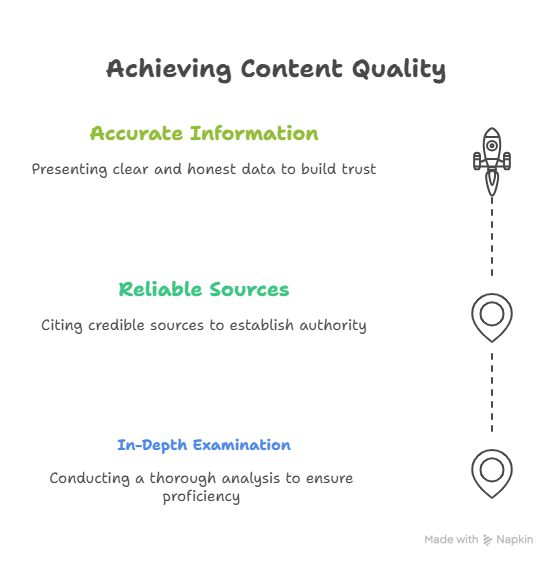More than 70% of online encounters start with a search engine, in case you were unaware. This startling figure emphasizes how crucial Search Engine Optimization (SEO) is to online advertising. The argument between traditional human-written content and AI-generated content creation has drawn a lot of attention as the digital landscape changes.
Significant progress in content creation has been made possible by the development of artificial intelligence, but there are still concerns regarding the relative usefulness of AI-generated content versus conventional human-written content for SEO tactics.
The effectiveness of AI-generated content versus human-written content in SEO will be discussed in this article, along with how each affects online visibility and contributes to SEO strategies.
Understanding Content Creation in the Digital Age
The landscape of content creation has changed as a result of the development of artificial intelligence. With the advancement of AI-powered tools, content creation is no longer solely the responsibility of human writers.
How AI Content Generation Works
Natural language processing (NLP) is a key component of AI content generation, which produces content that resembles that of humans. Large volumes of data are analyzed by NLP algorithms, which help AI systems discover linguistic structures and patterns.
AI is able to produce content through this process that is frequently identical to human-written content. However, the algorithms employed and the data used for training determine the caliber of content produced by AI.
The Strengths of Human Writers
Even with AI’s advances, human writers still have special advantages when it comes to producing content. They can add originality, compassion, and life experience to their writing, which makes the subject matter more approachable and interesting.
A degree of flexibility that AI systems are currently unable to match is provided by human writers’ ability to modify their tone and style to fit various audiences and situations.
Current Limitations of Each Approach
There are drawbacks to both AI and human content production. The emotional depth and subtlety that human writers offer may be absent from content produced by AI. However, human authors may be constrained by their unique viewpoints and life experiences.
| Content Creation Method | Strengths | Limitations |
|---|---|---|
| AI Content Generation | Scalability, Speed, Consistency | Lack of Emotional Depth, Limited Creativity |
| Human Writers | Creativity, Empathy, Personal Experience | Limited Scalability, Subjective Perspective |
AI vs Human Written Content: SEO Performance Comparison
The comparison of AI-generated and human-written content in terms of SEO performance is more pertinent than ever thanks to the development of machine learning. Knowing how these two kinds of content compare to one another is essential as we dig into the nuances of SEO.
Search Engine Ranking Factors
Search engines rank content using intricate algorithms that take into account a number of variables. Quality and relevance of the content are crucial. Content produced by AI can be optimized for particular keywords, which could raise its ranking. But when it comes to offering readers high-quality, nuanced information, human-written content frequently shines.
- Optimization of keywords
- Freshness of content
- Signals related to user experience
Although the methods are different, both AI and human content can be optimized for these factors. Humans contribute a deeper comprehension of context and relevance, while AI can swiftly analyze and adjust to new keyword trends.
Content Quality and E-E-A-T Considerations
When assessing the quality of content, the E-E-A-T criteria—Experience, Expertise, Authoritativeness, and Trustworthiness—are essential. These characteristics are inherent in human writers, particularly those who are subject-matter experts. Even though it is getting better, AI-generated content frequently falls short in terms of authority and reliability.
- Exhibiting proficiency via in-depth examination
- Making authority known by using reliable sources
- Providing accurate and transparent information to foster trust

AI content must be meticulously selected and evaluated in order to improve E-E-A-T, frequently necessitating human supervision.
User Engagement and Bounce Rates
Time on page and bounce rates are two examples of user engagement metrics that have a big impact on SEO rankings. User-engaging content typically performs better. Even though AI is capable of producing interesting content, human authors are typically better at creating stories that draw readers in and hold their attention.
Relevance, readability, and content structure are some of the elements that affect user engagement. The human touch frequently produces more captivating storytelling, but both AI and human content can be optimized for these factors.
Cost-Effectiveness and Scalability
Lastly, two important factors to take into account are the cost-effectiveness and scalability of content creation. The production of AI-generated content is frequently quicker and less expensive, enabling content marketing initiatives to scale quickly. AI content may, however, differ in quality and applicability, necessitating further human editing.
Although it costs more and takes longer, human-written content has depth and quality that AI cannot yet match. The particular objectives and available resources of a company may influence the decision between AI and human content.
Conclusion: Finding the Right Balance for Your SEO Strategy
It’s evident from our exploration of the fields of AI-generated content and human-written content that each has advantages and disadvantages in terms of SEO performance. Finding a balance between the effectiveness of language models and the originality of human writers is essential to a successful SEO strategy.
Businesses can expedite their content creation process by utilizing AI for tasks like data analysis and content optimization. Human writers can concentrate on producing excellent, captivating content that appeals to their audience in the interim. This hybrid approach combines the emotional depth and subtlety that human writers contribute with the scalability and speed of AI.
It’s critical to assess the particular requirements of your SEO strategy when comparing written content produced by AI versus humans. You can maximize your online presence and allocate resources wisely if you are aware of the advantages and disadvantages of each strategy. In the end, a well-rounded strategy that combines the best features of both can result in higher search engine rankings and a more interesting user experience.
FAQ
What is the main difference between AI-generated content and human-written content?
AI-generated content is created using natural language processing and machine learning algorithms, whereas human-written content is crafted by individuals with their unique perspectives, creativity, and expertise.
How do search engines evaluate the quality of AI-generated content versus human-written content?
Search engines assess content quality based on E-E-A-T criteria (Experience, Expertise, Authoritativeness, Trustworthiness), and while AI-generated content can meet some of these criteria, human-written content is often considered more trustworthy and authoritative.
Can AI-generated content improve SEO rankings?
Yes, AI-generated content can improve SEO rankings if it is high-quality, relevant, and optimized for search engines. However, it may lack the nuance and emotional resonance of human-written content.
Is it cost-effective to use AI-generated content for SEO purposes?
AI-generated content can be more cost-effective and scalable than human-written content, but it may require additional editing and refinement to meet SEO standards.
How can I balance AI-generated content with human-written content in my SEO strategy?
To strike a balance, consider using AI-generated content for routine or data-driven tasks, while reserving human-written content for more creative, empathetic, or high-stakes content that requires a personal touch.
Will AI-generated content replace human writers in the future?
While AI-generated content is becoming increasingly sophisticated, it is unlikely to fully replace human writers, as human creativity, empathy, and expertise are essential for crafting high-quality, engaging content that resonates with audiences.
How can I ensure that my AI-generated content is optimized for search engines?
To optimize AI-generated content for search engines, focus on using relevant keywords, meta descriptions, and optimizing images, as well as ensuring that the content is high-quality, informative, and engaging.




